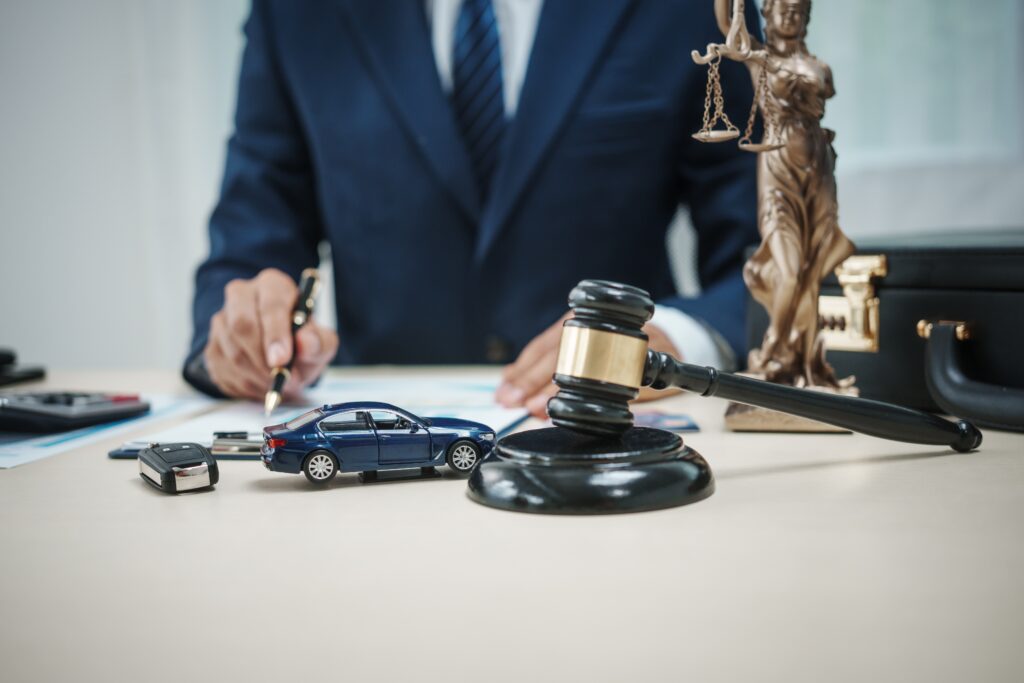Car accidents can be life-altering events, leaving victims feeling overwhelmed, confused, and uncertain about their future. If you've recently been involved in a car accident in Connecticut, you're likely grappling with many emotions and practical concerns. Is it too late to talk to a lawyer? Is your case worth their time?
After an auto accident, talk to an experienced Connecticut car accident lawyer. A local legal team can evaluate your wreck to determine if you can file a personal injury claim, advise you about your rights, and help you take steps to protect your health and financial well-being.
The Flood Law Firm stands as a guardian for those who have suffered harm through no fault of their own. Our unwavering focus is on advocating for the injured and holding responsible parties accountable, allowing our clients to focus on healing while we handle the complex legal challenges.
Understanding Your Situation After a Car Accident
First and foremost, take a deep breath. It's entirely normal to feel overwhelmed after an accident. You might be worried about your injuries, mounting medical bills, time off work, damage to your vehicle, or how this event will impact your daily life. These are all valid concerns.
The hours and days following a car accident can be critical for your physical recovery and for preserving your legal rights. While you may have taken some immediate steps at the accident scene, such as exchanging information with the other driver and calling the police, there are many important actions to consider.
Visit Your Doctor

Even if you believe your injuries are minor, seek medical attention immediately. Some injuries, such as whiplash or internal trauma, may not be immediately apparent but can have serious long-term consequences if left untreated.
Additionally, having a medical record that documents your injuries immediately after the accident can help if you need to file a car accident claim or personal injury lawsuit later.
Report the Accident to Your Insurance Company
Notify your insurance company about the accident as soon as possible. Most policies require prompt reporting, and failing to do so could jeopardize your coverage. However, be cautious about what you say. Stick to the basic facts and avoid admitting fault or downplaying your injuries.
Don't Sign Anything Without Legal Advice
Insurance companies may pressure you to sign documents or accept a settlement. Always consult with your attorney before signing anything. Also, avoid discussing the accident with the other driver's insurance company. Direct all inquiries to your attorney.
Gather and Organize Information
Collect all the information you have related to the accident. This may include:
- Photos of the accident scene and vehicle damage
- Contact information for witnesses
- The police report number
- Medical records and bills
- Correspondence with insurance companies
Organize these documents in a dedicated folder or file. You will need this information to file a claim.
Keep a Journal
Start a journal to document your physical symptoms, emotional state, and how the accident affects your daily life. This can prove the accident's impact on your well-being.
Be Cautious About Social Media
Avoid posting about the accident on social media platforms. Insurance companies and defense attorneys may use your posts to dispute your claims about injuries or emotional distress.
Contact a Personal Injury Attorney
Reach out to a reputable personal injury attorney at The Flood Law Firm for your free consultation. An experienced lawyer can provide valuable guidance on protecting your rights, dealing with insurance companies, and determining if you have a viable claim. They can also help you avoid common pitfalls that might jeopardize your case.
Understanding Connecticut Car Accident Laws
Connecticut follows a fault system for car accidents, which means the person responsible for causing the car accident is also responsible for any resulting harm. However, Connecticut also follows a "modified comparative negligence" rule.
This means that if you were partially at fault for the accident, your compensation may be reduced by your percentage of fault. If you're found to be more than 51% at fault, you may be barred from recovering compensation.
Don’t worry about figuring out how these rules apply to your case, and certainly don’t let them discourage you from talking to a lawyer. An experienced Connecticut car accident attorney will evaluate your car accident case to minimize your fault and maximize your compensation.
Other key points of Connecticut car accident law include:
Statute of Limitations: In Connecticut, you generally have two years from the accident date to file a personal injury lawsuit. For property damage claims, you have three years.
Minimum Insurance Requirements: Connecticut law requires all drivers to carry minimum liability insurance of:
- $25,000 per person for bodily injury
- $50,000 per accident for bodily injury
- $25,000 per accident for property damage
No-Fault Insurance: Connecticut is not a no-fault state, so you're not required to file a claim with your insurance company before pursuing a claim against the at-fault driver.
Uninsured/Underinsured Motorist Coverage: Connecticut law requires that all auto insurance policies include uninsured and underinsured motorist coverage equal to the policy's liability limits unless the policyholder requests a lower amount in writing.
Should You Hire a Lawyer?
One of the most common questions after a car accident is whether to hire a lawyer. The short answer is: After a car accident, always consult a lawyer. Many people worry their case isn't "big enough" to warrant legal help, but the truth is, any injury can have unforeseen consequences.
Here are some situations where hiring a lawyer is particularly important:
- You've suffered significant injuries or permanent disability
- You've had to miss work due to your injuries
- The accident involved multiple parties
- Fault for the accident is disputed
- The insurance company is offering a low settlement or denying your claim
- The accident occurred in a construction zone or involved a commercial vehicle
Even if your case seems straightforward, an experienced attorney can often uncover additional sources of compensation and protect you from tactics insurance companies may use to minimize your claim.
How an Automobile Accident Lawyer Can Help
An experienced auto accident attorney can provide invaluable assistance in many ways:
- Navigate the Complex Legal System: The legal process can be confusing and overwhelming, especially when you're dealing with injuries and emotional trauma. A lawyer can guide you through each step, ensuring you meet all necessary deadlines and comply with legal procedures.
- Investigate the Accident: Lawyers have resources to conduct a thorough investigation of the accident, which may include:
- Obtaining and analyzing police reports
- Interviewing witnesses
- Consulting with accident reconstruction experts
- Gathering and preserving evidence
- Determine the Full Extent of Your Damages: An attorney can explain the full scope of your damages, including:
- Current and future medical expenses
- Lost wages and other income and loss of earning capacity
- Pain and suffering
- Emotional distress
- Property damage
- Negotiate with Insurance Companies: Insurance adjusters are trained to minimize payouts. An experienced lawyer can counter their tactics and negotiate for a fair settlement.
- Represent You in Court: If a fair settlement can't be reached, your lawyer can file a personal injury lawsuit and represent you in court.
- Provide Peace of Mind: Dealing with the aftermath of a car accident can be stressful. A knowledgeable advocate on your side can provide reassurance and allow you to focus on your recovery.
Common Worries and Concerns of Accident Victims
After a car accident, it's normal for accident injury victims to have many questions and concerns. Here are some common worries and how to address them:
Will I be able to afford a lawyer?

Many people worry about the cost of legal representation. However, most personal injury attorneys, including those at The Flood Law Firm, work on a contingency fee basis. This means you don't pay any upfront costs, and the attorney's fee is a percentage of your settlement or court award. If you don't win your case, you don't owe attorney fees.
How long will the process take?
The duration of a car accident case can vary widely depending on the complexity of the accident, the severity of injuries, and whether the case goes to trial. Some cases may be resolved in a few months, while others can take a year or more. Your attorney can give you a better estimate based on the specifics of your case and will work diligently to get you relief as soon as possible.
What if the accident was partially my fault?
As we mentioned earlier, Connecticut's modified comparative negligence rule means you can still recover damages even if you were partially at fault, as long as you weren't more than 51% responsible. However, your compensation will be reduced by your percentage of fault.
Will I have to go to court?
Many car accident cases are settled out of court. However, if a fair settlement can't be reached, your lawyer may recommend going to trial. The decision to go to court will always be yours to make, based on your lawyer's advice.
What if the other driver doesn't have insurance?
If the at-fault driver is uninsured or underinsured, you may be able to file a claim under your own uninsured/underinsured motorist coverage. An attorney can help you explore all available options for compensation.
How much is my case worth?
The value of a car accident case depends on many factors, including the severity of injuries, impact on your life, and available insurance coverage. An experienced attorney can provide a realistic estimate based on the specifics of your case and past similar cases.
The Claims Process: What to Expect
Understanding the claims process can help alleviate some of the stress and uncertainty you may feel. Here's a general overview of what to expect:
- Initial Consultation: If you decide to work with an attorney, your first step will be an initial consultation. During this meeting, you'll discuss your accident and injuries. The attorney will explain your rights and options and answer any questions you have.
- Investigation: Your lawyer will thoroughly investigate the accident, gathering evidence and speaking with witnesses.
- Medical Treatment and Documentation: While your case progresses, you need to continue any necessary medical treatment and keep detailed records of your recovery. Also, keep track of all medical bills and related expenses.
- Demand Letter: Once you've reached maximum medical improvement (the point where your condition stabilizes), your attorney will typically send a demand letter to the insurance company. This letter outlines your case and demands a specific amount of compensation.
- Negotiations: The insurance company will likely respond with a counteroffer, beginning the negotiation process.
- Settlement or Lawsuit: If a fair settlement can be reached, your case will be resolved. If not, your attorney may recommend filing a lawsuit.
- Discovery: If a lawsuit is filed, both sides will exchange information in the discovery process. This may include depositions, where you and other witnesses answer questions under oath.
- Mediation or Trial: Many personal injury lawsuits are resolved through mediation, where a neutral third party helps facilitate a settlement. If mediation is unsuccessful, your case may go to trial.
- Resolution: Whether through settlement or trial verdict, your case will ultimately be resolved. Your attorney will help you understand the outcome and what to expect moving forward.
Be patient. The legal process can be slow, but rushing to settle can result in inadequate compensation. Trust in your attorney's guidance and focus on your recovery.
The Importance of Experienced Legal Representation
While it's possible to handle a car accident claim on your own, having experienced legal representation can make a significant difference in the outcome of your case. Insurance companies have teams of adjusters and lawyers working to minimize their payouts. A knowledgeable advocate on your side levels the playing field and protects your rights.
At The Flood Law Firm, we have years of experience handling car accident cases in Connecticut. We understand the tactics insurance companies use and know how to build strong cases that demand fair compensation. Our team is committed to providing personalized attention to each client, ensuring you feel supported and informed throughout the legal process.
Remember, seeking legal counsel doesn't commit you to anything – it simply provides you with the information you need to make the best decision for your situation. Most reputable personal injury firms, including The Flood Law Firm, offer free initial consultations, allowing you to understand your options without any financial obligation.
Focus on Recovery, Let Us Handle the Rest
Being involved in a car accident can be a life-changing event, but you don't have to navigate it alone. By understanding your rights, taking proactive steps to protect your interests, and seeking experienced legal guidance, you can focus on what's most important – your recovery and well-being.

If you've been injured in a car accident in Connecticut, don't hesitate to reach out for legal advice. The Flood Law Firm is here to help you understand your rights and options. Remember, every car accident case is unique, and the information provided here is general guidance. Talk with a qualified Connecticut personal injury attorney for specific advice tailored to your situation. Your well-being is the priority, and with the right support, you can navigate this challenging time and move toward a brighter future. Call our home office in Middleton at (860) 346-2695 or contact us online.
